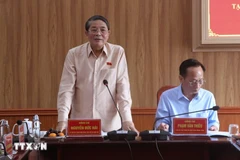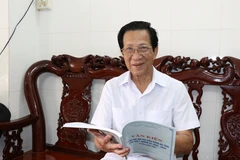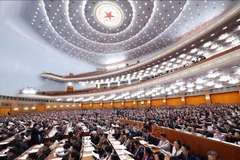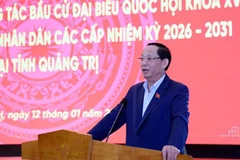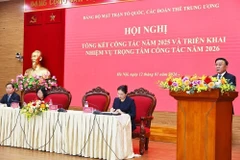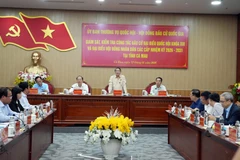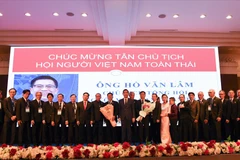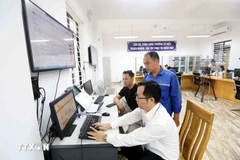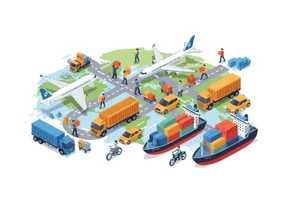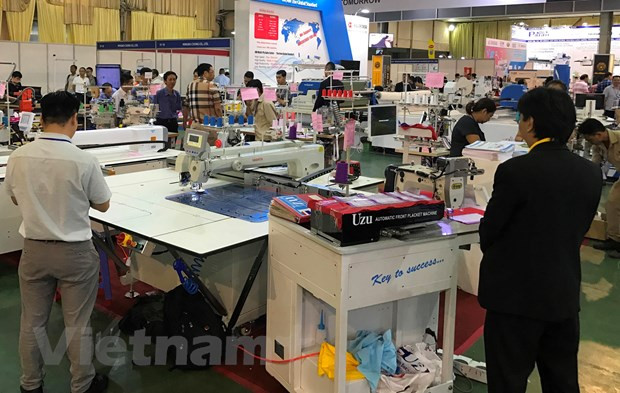 EVFTA will open the door to a big market for Vietnamese firms. Illustrative image (Photo: VietnamPlus)
EVFTA will open the door to a big market for Vietnamese firms. Illustrative image (Photo: VietnamPlus)
Hanoi (VNA) – The signing of the EU-Vietnam Free Trade Agreement (EVFTA) is expected to open up greater cooperative opportunities for Vietnamese firms, as the EU is not only the leading economic and trade partner of Vietnam but also the second most important export market after the US.
Bigger opportunities for exports
The EVFTA is a new-generation FTA between Vietnam and 28 member countries of the EU. It and the Comprehensive and Progressive Agreement for Trans-Pacific Partnership (CPTPP) are the two FTAs with the widest coverage and highest commitments that Vietnam has ever signed.
Under the EVFTA, tariffs on many Vietnamese exports will be immediately removed when the pact takes effect.
Economist Quang San, who has researched the EU markets for many years, said Vietnam is carrying out industrialisation and modernisation along with economic restructuring, with one of the priorities being promoting industrial production and enhancing added value of production and exports.
He said attracting more investment from the EU, which has abundant financial resources and particularly advanced technology and big market, will be a solution to help Vietnam accelerate the industrialisation process.
Furthermore, Vietnam can consider calling for investment into not only factories, but also supporting activities, such as designing consultation, technology transfer, and environmental industry.
“The EVFTA will provide a foundation for Vietnam to bolster its economic ties with not only the EU but also other partners in the world,” San said.
It is noteworthy that the economic and export structures of Vietnam and the EU are supplementary, so opportunities for trading are huge, he said.
Vice Rector of the National Economics University Hoang Van Cuong said when the EVFTA is approved, the positive impact will be greater than negative ones.
“We can see that Vietnam’s exports to the European market enjoy advantages as they face almost no competition from European products of the same kind,” Cuong said.
Strict EU requirements on quality
According to statistics of the Ministry of Industry and Trade, Vietnam shipped to the EU more than 18.72 billion USD worth of goods in the first five months of this year, an increase of 2.9 percent from the same period in 2018.
Meanwhile, EU’s exports to Vietnam in the same period were worth more than 6.96 billion USD, up 4 percent on a yearly basis.
This means Vietnam enjoyed a trade surplus of more than 11.7 billion USD in trade with the EU in the period.
Executive Director of Vietnam Textile and Garment Group (Vinatex) Cao Huu Hieu said the EU is the second biggest market of Vietnam’s textile-garment products, just behind the US. Exports to the EU have been growing at an average 7-10 percent each year.
“When the EVFTA takes effect, Vietnam’s textile-garment products will be entitled to tax exemption, so there will be a lot of opportunities for businesses in this market,” Hieu said.
It is a similar story with the leather-shoe industry, which has a great advantage in the EU market. When the EVFTA comes into force, Vietnam’s footwear products will enjoy deep tariff cuts in this market, giving them a big competitive edge.
Phan Thi Thanh Xuan, Vice President of the Vietnam Leather, Footwear and Handbag Association (LEFASO), reported that many domestic footwear makers have been able to create their own collections and designs to offer to customers, thus establishing their brand names and increasing the value of their products.
“We have made steps forward, from initially depending on customers for designing to engaging in the designing process, and some firms have even become able to make their own designs to offer to customers,” Xuan said.
In order to maintain firm footholds in the European market, products must meet strict requirements on technical standards, food safety and hygiene, technology and origin, which are still the weak point of many Vietnamese firms, said Vice Rector of the National Economics University Hoang Van Cuong.
He suggested that domestic firms work harder to meet the world’s standards and requirements, adding that this cannot achieved with small-scale production. Firms must invest in technology and expand production scale if they want to become a player on the world market, Cuong said.-VNA




